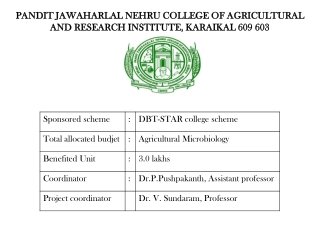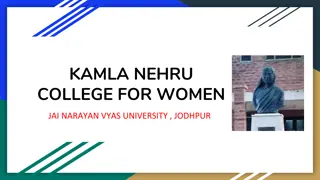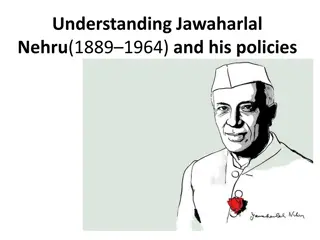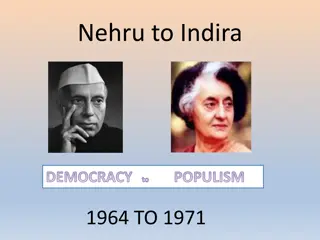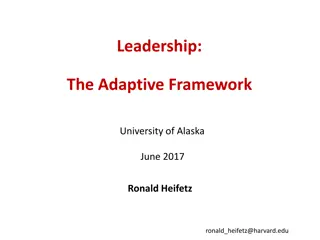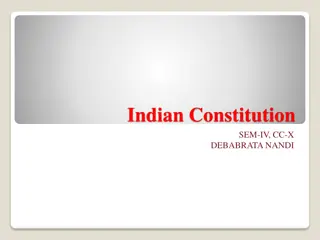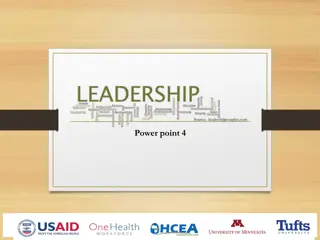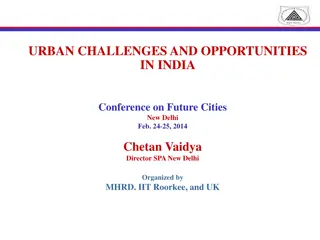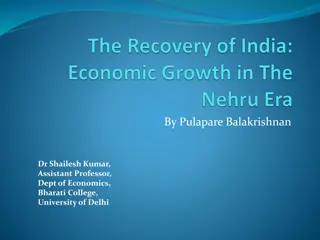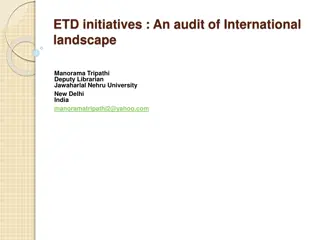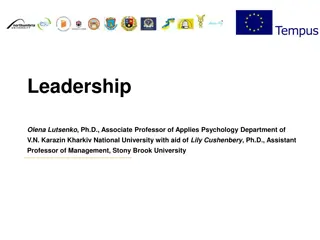Jawaharlal Nehru's Policies and Leadership
Jawaharlal Nehru, a key figure in India's nationalist movement, implemented policies focused on democracy, socialism, secularism, and national unity. His domestic initiatives encompassed social reform, education, and economic development, while his foreign policy advocated for the independence of colonized nations and led to the formation of the Non-Aligned Movement.
Download Presentation

Please find below an Image/Link to download the presentation.
The content on the website is provided AS IS for your information and personal use only. It may not be sold, licensed, or shared on other websites without obtaining consent from the author.If you encounter any issues during the download, it is possible that the publisher has removed the file from their server.
You are allowed to download the files provided on this website for personal or commercial use, subject to the condition that they are used lawfully. All files are the property of their respective owners.
The content on the website is provided AS IS for your information and personal use only. It may not be sold, licensed, or shared on other websites without obtaining consent from the author.
E N D
Presentation Transcript
INTRODUCTION OF THE SCHEME Centrally sponsored Schemes of Sarva Shiksha Abhiyan (SSA), Rashtriya Madhayamik Shiksha Abhiyan (RMSA) and Teacher Education (TE) have been integrated into a single scheme which has been named as Samagra Shiksha Abhiyan. This scheme will be implemented by the Education Department through single state implementation society from pre-primary to senior secondary level covering all children from age group 4 to 18 years. The fund sharing pattern for the scheme between centre and state is 60:40.
MAJOR OBJECTIVES OF THE SCHEME: Provision of quality education and enhancing learning outcomes of students; Bridging Social and Gender Gaps in School Education; Ensuring equity and inclusion at all levels of school education; Ensuring minimum standards in schooling provisions; Promoting Vocationalisation of education; Support States in implementation of Right of Children to Free and Compulsory Education (RTE) Act, 2009; and Strengthening and up-gradation of SCERTs/State Institutes of Education and DIET as a nodal agencies for teacher training.
MAJOR INTERVENTIONS UNDER THE SCHEME
Opening of New/Upgraded Schools New/Upgraded schools from class 1 to 12th. Norms foropening new schools: Primary Upper primary Secondary Higher & Senior Sec. = 07-10 km Preference may be given schools. Addition of new stream in existing senior secondary schools. Preference will be given to Educationally Backward Blocks (EBBs, Special Focus Districts (SFDs), Border areas and the 115 districts identified by Niti Aayog. Construction cost would be provided at a state schedule of rates or CPWD rates, whichever is lower. = 1 km = 03 km = 05 km to composite schools and consolidation of aspirational
Residential Schools/Hostels Support for reaching out to children in sparsely populated, or hilly and densely forested areas with difficult geographical terrain and border areas where opening a new primary or upper primary school and Secondary/Senior Secondary schools may not beviable Preference will be given to Educationally Backward Blocks (EBBs), Special Focus Districts (SFDs) and the 115 inspirational districts identified by Niti Aayog Construction cost would be provided at a state schedule of rates or CPWD rates, whichever is lower. Recurring grant would be approved as per normsof KGBV hostels. At present 05 residential hostels are being run in the state of Punjab namely: Amritsar, Tarn taran, Gurdaspur, Ferozepur & Fazilka.
Strengthening of Existing Schools Science and maths Lab, Computer Room, Art Cultural Room, Library, ACR, Water & Toilet, essential classroom furniture, School infrastructure as per the provisions in the Schedule of the RTE Act, 2009 Major Repair, Minor Repair, Electrification, Residential Quarters for teachers in remoteand difficultareas. Details may kindly be seen implementationas emailed toall of you. in the framework for
Transport/Escort Facility Provision for sparse population where opening of schools is unviable or where Gross Access Ratio is low or where State specific proposal of consolidation of schools is received. transport /escort facility for Children in remote habitations with State would need to notify such habitations and identify the number of children in that habitation who would be provided this facility. This would be appraised based on the data provided by the State for such children under SDMIS. (Admissibility for Govt. Schools) Transport facility may be provided up to an average cost @ Rs. 6000/ per child per annum up to Class VIII.This would be appraised based on actual cost to be incurred as per the distance, the terrain and the type of transport facility to be provided. The option of Cash transfer will be allowed in the form of DBT to Aadhar linked bank accounts
Free Uniforms Two sets of uniforms for all girls, and children belonging to SC/ST/BPL families in Government schools up to class VIII at an average cost of Rs. 600/- per child per annum. The option of Cash transfer will be allowed in the form of DBT to Aadhaar linked bank accounts. These will be appraised based on the data provided by the State for such children under SDMIS.
Free Textbooks Provision Government/Local including curriculum, at an average cost of Rs.250/- per child at primary level and Rs.400/- per child at upper primary level. The option of Cash transfer will be allowed in the form of DBT to Aadhaar linked bank accounts. These will be appraised based on the data provided by the State for such children under SDMIS. Incentive for Reuse of Textbooks for textbooks Body to all children aided in and Government of introducing schools, the Madarsas desirous State
Reimbursement towards expenditure incurred for 25% of admissions under Section 12 (1) (c), RTE Act. As per Section 12(1)(c), reimbursement needs to be provided for admission of EWS students in neighborhood private unaided schools. This reimbursement would be done based on proof of actual payment to schools by the States. There should be a transparent system of admissions and monitoring system forsuch admissions. The reimbursement would be based on per child norms notified by the State/UTs for classes I to VIII subject to a maximum ceiling of 20% of the total AWP&B approved by the GOI for State/UTs under the Programme.
Special Training for age appropriate admission of out- of-school children (OoSC) at Elementary Level Special Training child, admitted to an age appropriate class, to integrate academically and emotionally with the rest of the class. Up to Rs 6,000/- per child per annum for non-residential courses. Up to Rs20,000/- per child per annum for residential courses. Item-wise costs to be worked flexibility for the needs of different kinds of children, and approved by the State Executive Committee of project within the overall ceiling. At present 04 Residential Special Training centres are being run in districts: Patiala, Jalandhar, Bathinda & Ferozepor enrolling 50 children of age group 6-14 years in each hostel . facility for out-of-school children to enable a out to provide adequate
Media and Community Mobilization Activities to enhance Community participation and monitoring for universal access, equity and quality Workshops/Lectures/Programmes Awareness on RTE Act, Learning Outcomes etc. Execution of Media Plans for publicity of the objectives of the Scheme Preparation of related audio-visual, print material etc. Up to @Rs. 1500 per school for Government Schools subject to specific plan for creating
Training of SMC/SDMC Capacity building and Support to SMCs/SDMCs. Up to @ Rs 3000 per school for Government Schools subject to a specific plan
(III) QUALITY INTERVENTIONS
Learning Enhancement Programme (LEP)/Remedial teaching Interventions for enhancement of Learning students in areas having lower performance under Achievement Survey. Developing modules and exemplar material for teaching-learning,teacher training and continuous and comprehensive evaluation. Activities under Padhe Bharat Badhe Bharat (Padhe Punjab Padhao Punjab project in Punjab) for early grades. Remedial teaching after identifying and post assessment to be conducted to see outcomes. (Admissibility for Govt. Schools) Financial Support will be provided under State Specific project as per the allocation of flexi fund under quality subject to viable proposal received from the State/UTs. Remedial teaching programmes/LEP may be provided for weaker students at a unit cost of uptoRs. 500 per student based on an assessment. Outcomes especially for the National students based on an assessment after proper identification
Assessment at National & State level For assessment of along with assessment external agency forclasses 1 to 12th periodically. Analysis of assessment results and linkage with the design of Learning Programmes/Remedial teaching teachers. Up to @Rs. 10 to 20 lakhs per district depending upon the size of the districts and states. learning levels of evaluation, be through children mode NCERT/other school would the of Enhancement and training of
Composite school Grant Number of students in School School Grant Rs. 25000/-(including at-least Rs 2500 for swachhta action plan). Rs. 50,000/- (including at-least Rs. 5000 for swachhta action plan). 100 >100 to 250 > 250 to 1000 Rs. 75,000/- (including at-least Rs 7500 for swachhta action plan). > 1000 Rs. 100,000/-(including swachhta action plan). at least Rs.10000for
Utilization of Composite School Grant The grant is meant to provide conducive learning environment in schools. School grant can be used for replacement of non- functional school equipment and for recurring costs such as consumables, play material, electricity charges, internet, water, teaching aids, repair & maintenance of school building, toilets and other facilities etc. newspapers,
Libraries Strengthening of school libraries including purchase of books Up to @ Rs. 5,000/- for primary school and Rs.10,000/- forupperprimary school. Up to @ Rs. 13,000/- for composite elementary schools (Class I toVIII). Up to @ Rs. 10,000/- for Secondary schools (Classes 9thand 10th). Up to @ Rs. 15,000/- forclass 6th to 12th.
Up to @ Rs. 15,000/- for composite Secondary Schools (class 1 to 10th). Up to @ Rs. 15,000/- for composite Secondary Schools (class 9th to 12th). Up to @ Rs. Rs.10,000/- Senior Secondary school only (class 11 to 12th). Up to @ Rs. 20,000/- for composite Senior Secondary school (class 1 to 12th). These grants will be available on an annual basis.
Rastriya Avishkar Abhiyan (RAA) To promote Science and Maths learning at upper primary to Senior Secondary (for classes VI to XII) as per the guidelines of RAA. Depends upon the State specific proposal which would include Science and Maths kits, Science and Maths fair/exhibitions, capacity building of Science and Maths Teachers, exposure visits, mentoring by highereducational institutions etc.
ICT and Digital Initiatives The component will Flexibility to procure hardware such as tablets/ laptops/ notebooks/ integrated teaching learning devices and open source operating system as well as Hardware, Software, training and resource support. This would include support for digital boards, smart classrooms, virtual classrooms and DTH channels on pro-rata basis for numberof schools approved. For schools having classes 6 to 12, a non-recurring grant of up to Rs. 6.40 lakh per school and recurring grant of upto Rs.2.40 lakh per school per annum for a period of 5 years. cover classes VI to XII.
Innovation Flexible funds for innovation. State Specific Projects for improvement of Quality and access of Education. Activities like Ek Bharat Shreshta Bharat(Twinning of schools, Student Exchange programme etc.), Kala Utsav, Yoga Olympiad, Band competitions etc. Financial Support will be provided Specific project as per the allocation of flexi fund under quality to the state subject to viable proposal received from the State/UTs. under State
Other Quality Initiatives Flexible funds for innovation. State Specific Projects for improvement of Quality and access of Education. Activities like Ek Bharat Shreshta Bharat, Kala Utsav, Yoga Olympiad, Band competitions etc. Financial Support will be provided under State Specific project as per the allocation of flexi fund under quality to the state subject to viable proposal received from the State/Uts.
Support at Pre-Nursery level At pre-nursery level support for training of Anganwadi workers for pre-nursery education in line with the NCERT Framework, co-location of Schools and curriculum development in convergence with Ministry/Department of Women and Child Development can be provided. Support the efforts of State Government in setting up pre-nursery schools (Admissibility for Govt. Schools). Based on State-specific proposal. Recurring Grant, including manpower deployment, of upto Rs 2 lakh per school and non-recurring grant of upto Rs 1 lakh perschool. Anganwadis in Primary
Teacher Salary (HMs/Teachers) Teachers will be recruited as per the terms and conditions of the respective States/Uts. Salary Structure will be determined by the State norms forsalaries. There will be no separate cadre of teachers sanctioned by the Centre. All teachers are ultimately the responsibility of the State Govt. Salary Structure will be determined by the State norms for salaries.The Central share under the Scheme for teachers salaries will be restricted as per the prevalent fund sharing pattern based on the financial norms given below: a. Primary Teachers: up to Rs. 15000 per month b. Upper Primary teachers : up to Rs. 20000 per month c. For secondary teachers : upto Rs.25,000 per month d. Head Teachers: up to Rs. 25000 per month e. Head Master/Principal: up to Rs. 30000/- per month f. Part time teachers (for Arts, Physical & Health Education & Work education): up to Rs. 7000 per month In case of a composite school, the Head Teacher of the senior most level will be in-charge of the whole school.
Kasturba Gandhi Balika Vidyalaya (KGBV) KGBVs to be extended up to Class 12th smooth transition of Senior Secondary. Priority will be given for up-gradation of KGBV where the Girls Hostel has been established in the same campus and there is no secondary/Senior Secondary school in thevicinity. For building as per SSOR/CPWD rates, whichever is lower for girls from Elementary to
A recurring grant would be provided as below to account for all expenses including manpower cost: (i) For KGBVs for classes VI to VIII of upto Rs 60 lakh per annum (ii) For KGBVs for classes VI to X of upto Rs 80 lakh per annum (iii)For KGBVs for classes VI to XII of upto Rs 1 crore per annum (iv)For existing Stand-alone Girls Hostels for classes IX to XII of upto Rs 25 lakh
Self Defense training for Girls Training defense protection and self-development. (Admissibility for Govt. Schools) Provision for upto Rs. 3000 per month for 3 months per school for schools having classes VI to XII. for 3 skills months for inculcating including life self self skill for
Special projects for equity Special state specific projects for enhancing access, retention and enrolment drives, retention and motivation camps, gendersensitization modules etc. Financial Support will be provided under State Specific project as per the allocation of flexi fund under quality to the state subject to viable proposal received from the State/UTs. quality such as
Provision for children with special needs (CWSN) The key thrust of Programme will be on providing inclusive education to all children with schools. Funding will be based on data of CWSN provided under SDMIS. Programme will also support special training, education through open learning system, home schooling, wherever necessary, itinerant teaching, remedial rehabilitation (CBR) and vocational education. Provision of up to Rs. 3500 per child per year for children with special needs, studying in government, government aided and local body schools as per specific proposal. This will include aids and appliances, teaching material, stipend for CWSN girls @ Rs. 200 per month for 10 months. Provision of special educators at cluster/school level as per requirement and financial norms for salary of special educators according to teachersalary norms. special needs in general teaching, community based
(VII) VOCATIONAL EDUCATION
Introduction of Vocational Education at Secondary and Senior Secondary Vocational Education to be introduced as an integral part of general education at Secondary and Senior Secondary level as per guidelines of vocational education scheme. The vocational subjects are to be introduced as an additional subject at the secondary level and as compulsory (elective) at the Senior Secondary level. Construction of Workshop/laboratory cum Class room @ State Schedule of Rate (SSOR) as per requirement of States/Uts. Induction Training of 10 days and In-service training of 05 days for Teachers/Skill Trainers including re-training of existing vocational trainers in relevant job roles @ Rs. 300- 500 perday per trainee.
Recurring grant norms under vocational education: Composite schools (Classes IX XII) Non-Composite schools ((Classes IX X) / (XI - XII)) Components Financial support for One vocational teacher/trainer per job role (@ Rs. 20,000 - 25,000/- per month) 12.00 6.00 Provision for financial support for engaging resource persons 2.50 1.25 Raw Materials, maintenance of tools and equipments purchase of books, software, e- learning material etc. 4.50 2.25 Cost of providing hands on skill training/on the job training to students 2.40 1.20 Cost of Assessment and Certification @ Rs. 600/- for Class X and XII 0.96 0.48 Office Expenses/ Contingencies (including expenditure on awareness & publicity, guidance and counselling, transport, field visits, 2.00 2.00
(VIII) SPORTS AND PHYSICAL EDUCATION
SPORTS AND PHYSICAL EDUCATION The sports equipment will be provide under this component. Expenditure for meeting expenses on procuring sports equipment for indoor & outdoor games inn convergence with Department of Sports. (Admissibility for Govt. Schools) Up to Rs.5,000 for Primary school Up to Rs.10,000 for upper primary Up to Rs.25,000 for Secondary and Senior Secondary
(IX) STRENGTHENING OF TEACHER EDUCATION
Strengthening of physical infrastructure & Establishment of new DIETs For lecture halls, seminar rooms, hostel facilities, repairs and renovations, etc. include renovation of buildings, expansion and modernisation . Establishment of Special Cells: Laboratories for Science, Mathematics, Social Technology, Computer & Language, English education. Establishment of New DIET* in the plan period: The existing norm of districts created up to March, 2011, will be modified to include newdistricts created upto 31st March, 2017. Studies, Educational establishing DIETs in all
Construction cost As per State SOR or CPWD and Rs 20.00 lakh forequipment (non recurring) Establishment of Special Cells for SCERT (One time Grant) : UptoRs.50.00 lakh per SCERT/SIE (10 lakhs per Special Cell) (Non- recurring) Establishment of New DIET* in the plan period: As per State SOR or CPWD Rs 20.00 lakh for Equipment (Non- recurring)
Salaries of Teacher Educators (TEIs) Central Educators is proposed to be restricted to 70% of the filled up posts and 60% of the filled up posts for the year 2018-19 and 2019- 20. support for salary of Teacher
Training for In-service Teacher, Head Teachers and Teacher Educators To emphasize the integration of training structures in States, the funds for teachers training would be implemented through SCERTs who will be the nodal agency in the State to conduct in-service teachers training. This may be done in close coordination with CTEs and IASEs. The detailed norms for training may be seen in framework for implementationas emailed toyou.
Financial norms for Training For Teachers: a) Refresher In-service training upto 10 days for all teachers @ Rs300-500/- per teacherperday. b) Residential Induction training for newly recruited teachers for 30 days up to @ Rs 300-500/- perday. ForHead Teachers: a) Refresher residential in-service training of 10 days for all teachers each year at BRC level and above up to @300- 500 per teacherperday. b) Head Master/Principal for Leadership Training through NIEPA/State leadership Academy up to @ Rs. 4800/- per Head Master/Principal peryear. For Resource Persons: Refresher training for all Resource Persons, Master Trainers, BRC and CRC faculty and coordinators for upto 10 days up to @ Rs 300-500/- per person perday.
Financial norms for Training Training of Educational Administrators Residential State level Training of upto 5 days for Educational administrators @ uptoRs 1000 per person per day Training for Teacher Educators: Residential Training upto 10 days Orientation/ Induction Training of Teacher Educators (SCERTs): Rs. 300-500 per participant per day upto 10 days Training of DIET Faculty as Master Trainers (SCERTs) Up to @ Rs.4800/- per DIET faculty per year.
DIKSHA (National Teacher Platform) DIKSHA is digital infrastructure for knowledge sharing. It is a driver forquality intervention. It is to accelerate and amplify solutions, experiments and innovations being undertaken in the areas of teacher training and professional development. It involves software development/maintenance for DIKSHA, setting-up of project team, creation, curation and translation of digital content, capacity building, awareness and communication drive etc. as perstate-specific proposal. The SCERT/SIE would be the nodal agency.
Program Activities and Specific projects for Research activities (DIETs) Funds specific projects forresearch Upto Rs. 40.00 lakh per DIET for Program activities (Recurring /year) Upto Rs. 10.00 lakh per DIET for Specific projects for Research activities(Recurring /year) for programme activities and


